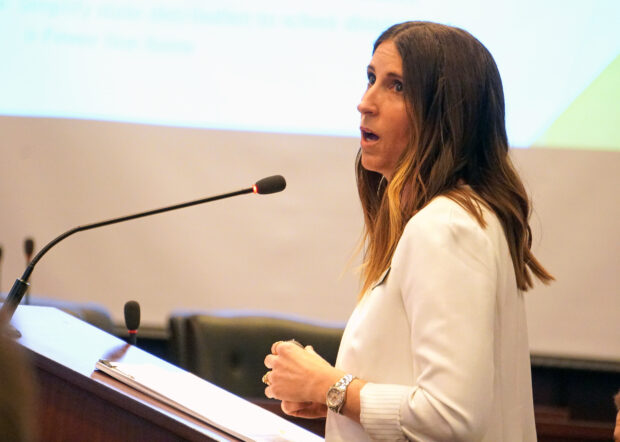Voting unanimously, the Senate Education Committee signed off on another piece of Gov. Brad Little’s education agenda: a $50 million education grants program.
Senate Bill 1255 would create a federally funded Empowering Parents Grant Program — which would help cover costs for computers, textbooks, physical therapy or other needs.
The grants — up to $1,000 per child or $3,000 per household — would be awarded based on need, with money going first to families with an income of under $60,000.

“This allows parents to really customize their child’s education,” said Sen. Lori Den Hartog, R-Meridian, the bill’s Senate sponsor.
SB 1255 is a sequel. In the fall of 2020, Little launched a popular predecessor: the Strong Families, Strong Students grants program. By the end of 2020, the state handed out grants to 18,465 families.
A bill to extend the program stalled out in 2021, partly because of a controversial clause. The 2021 version of the bill would have allowed families to use grant dollars for private school scholarships. Several education groups opposed that bill, calling it a roundabout attempt to create a voucher program.
Idaho Education Association Executive Director Paul Stark noted last year’s language, and last year’s dustup, during Monday’s Senate Education meeting. While SB 1255 doesn’t expressly forbid using grants for private school scholarships, Stark noted that bill backers have said they don’t plan to pursue a scholarship program — so IEA is “cautiously supporting” the bill.
Other groups were more enthusiastic. The Idaho Association of School Administrators, the Idaho School Boards Association and the Idaho Association of Commerce and Industry all said they see SB 1255 as a unique opportunity to help parents navigate their needs, two years into the pandemic.
The committee only heard opposition from one group: Homeschool Idaho. Barry Peters, an attorney representing the 3,000-member group, said he was concerned that the state funding could threaten the autonomy of homeschoolers.
Den Hartog said the bill contains safeguards to protect homeschoolers, and she noted that 4,700 homeschool households received a share of the 2020 grants.
SB 1255 now heads to the Senate floor for a vote, perhaps later this week.
Dyslexia bill makes its debut
The State Department of Education would be required to begin offering statewide dyslexia screenings in 2022-23, under a bill introduced Monday.
Sponsored by Sen. Robert Blair, R-Leland, the bill would require the SDE to identify “reliable, valid, universal and evidence-based screening, intervention measures and professional development” to address dyslexia in kindergarten through fifth grade.
Senate Education introduced the bill Monday without discussion, which means it could come back to the committee for a full hearing at a later date.
Center seeks funding boost to support ‘STEM-designated schools’
Idaho’s number of “STEM-designated schools” could grow from six to 11 within the next year.
And on Monday, the STEM Action Center put in a pitch for funding to provide grants and teacher training for these schools.
The designation would recognize schools — at all grade levels — that provide high-quality programs in the “STEM” disciplines of science, technology, engineering and math.
Schools that get the STEM designation can receive up to $10,000 a year for five years, for staff training and equipment. And with more schools likely to receive this designation, the STEM Action Center is seeking an additional $83,000 in 2022-23 to support the grant program.
It’s the one line item in an otherwise hold-the-line budget request. The STEM Action Center is seeking slightly more than $3.1 million from the state’s general fund, a 3.1% increase.
The request comes as the demand for STEM jobs continues to grow. The number of STEM jobs is expected to grow by more than 15% by 2030 — and the jobs pay nearly twice as much as non-STEM jobs.
“There is still more work to be done,” STEM Action Center executive director Kaitlin Maguire told the Joint Finance-Appropriations Committee Monday.
A CTE funding tweak
The Senate Monday easily passed a bill to allow multi-school district partnerships to receive added funding for career-technical education.
The partnerships, called cooperative service agencies, include the Canyon-Owyhee School Service Agency in Wilder and the Kootenai Technical Education Campus in Rathdrum, popularly called COSSA and KTEC.
Both have received funding from the state for years, so the change would only correct code so COSSA and KTEC can legally continue to receive their funds.
Only Sen. Jim Rice, R-Caldwell, opposed Senate Bill 1247 in a 33-1 vote, and there was no debate.
SB 1247 now heads to House for a potential committee hearing.
More rules discussion in House Education
The House Education Committee met Monday morning, continuing its annual rundown of administrative rules, which the committee and its Senate counterpart will vote on later in the session.
And committee members discussed Little’s proposals to spend federal American Rescue Plan Act money on education. The committee will be able to provide input on the proposals to JFAC, though JFAC will have the final say on whether stimulus dollars are sent to schools or not.
